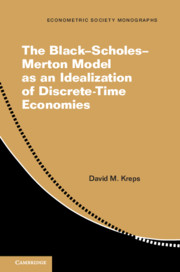
- Cited by 4
-
Cited byCrossref Citations
This Book has been cited by the following publications. This list is generated based on data provided by Crossref.
Kreps, David M. and Schachermayer, W. 2019. Convergence of Optimal Expected Utility for a Sequence of Discrete-Time Market. SSRN Electronic Journal ,
Kreps, David M. and Schachermayer, Walter 2020. Convergence of optimal expected utility for a sequence of discrete‐time markets. Mathematical Finance, Vol. 30, Issue. 4, p. 1205.
Kreps, David M. and Schachermayer, Walter 2021. Asymptotic synthesis of contingent claims with controlled risk in a sequence of discrete‐time markets. Theoretical Economics, Vol. 16, Issue. 1, p. 25.
Hubalek, Friedrich and Schachermayer, Walter 2021. Convergence of optimal expected utility for a sequence of binomial models. Mathematical Finance, Vol. 31, Issue. 4, p. 1315.
- Publisher:
- Cambridge University Press
- Online publication date:
- September 2019
- Print publication year:
- 2019
- Online ISBN:
- 9781108626903
- Series:
- Econometric Society Monographs (63)




